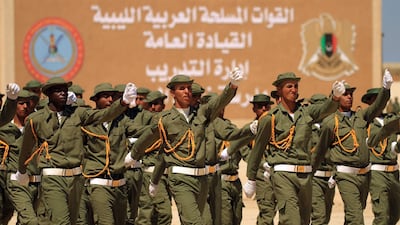The US and Russia said on Friday they could not support a UN Security Council resolution calling for a ceasefire in Libya at this time, diplomats said.
Meanwhile, mortar shells crashed down on a suburb of the Libyan capital Tripoli.
Russia objects to the British-drafted resolution blaming eastern Libyan commander Khalifa Haftar for the latest flare-up in violence when his Libyan National Army advanced to the outskirts of Tripoli this month.
The US gave no reason for its stance on the draft resolution, which would also call on countries with influence over the warring parties to ensure compliance and for unconditional humanitarian aid access in Libya.
The country has been gripped by chaos since Muammar Qaddafi was toppled in 2011.
To pass, a resolution needs nine votes and no vetoes by the US, Britain, France, Russia or China, the five permanent members of the council.
It was not clear if Britain would persist with negotiations on a draft next week.
The US and Russia made their positions clear during a closed-door council briefing by UN Libya envoy Ghassan Salame.
Diplomats said Mr Salame appealed for the ceasefire as weapons were pouring into the country and it was heading towards a serious humanitarian situation.
The US reluctance to support Security Council action is in contrast to Washington's earlier public opposition to Field Marshal Haftar's offensive, which began while UN Secretary General Antonio Guterres was visiting Tripoli.
Some UN diplomats have suggested that the US might be trying to buy time as President Donald Trump's administration works out how to deal with the latest developments.
"I think there are a range of views in Washington on the policy side and they haven't reconciled them and they're not entirely certain where the president is on it," a senior UN diplomat said.
"The American system is trying to evaluate all the scenarios and work out which one is in America's best interest, and just hasn't done that yet."
A united Security Council informally expressed concern on April 5, calling on all forces to halt military activity, particularly the LNA.
But in the following days, the council was unable to issue a more formal statement because Russia objected to a reference to the LNA, while the US said it could not agree on a text that did not mention Field Marshal Haftar's force.
US Secretary of State Mike Pompeo said on April 7 that: "We have made clear that we oppose the military offensive by Khalifa Haftar's forces and urge the immediate halt to these military operations against the Libyan capital."
Most western powers have supported Fayed Al Sarraj, Prime Minister of the internationally recognised government in Tripoli, which is being defended by various militias.
The LNA supports a rival government set up in the eastern city of Tobruk.
Mr Trump met Egyptian President Abdel Fattah El Sisi on April 9.
French Foreign Minister Jean-Yves Le Drian spoke with Mr Pompeo about Libya on Thursday and both agreed of the need for a rapid ceasefire and return to the UN-led political process.
Paris has given Field Marshal Haftar support in the past.

